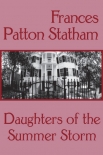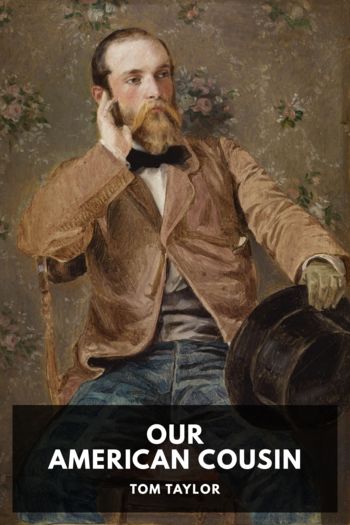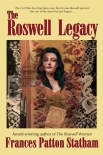Daughters of the Summer Storm, Frances Statham [classic reads txt] 📗

- Author: Frances Statham
Book online «Daughters of the Summer Storm, Frances Statham [classic reads txt] 📗». Author Frances Statham
The child, Tefe, was moved into the nursery with Paulo to be watched over by Naka. And in the days that followed, Maranta would sit on the veranda with the two children by her side.
It was late afternoon when the little green bird appeared on the veranda. At the sight of the familiar little bird, Maranta smiled. "Look, Tefe. It's Fado," she said. "He has come home." They watched as he hopped about as if not quite sure of his welcome. "I wonder if he is hungry."
Together, they took the cage and filled it with seed and left it on the table where the bird was used to sunning himself as Maranta painted. And then, they went inside the house.
The next day, the seed was gone, and Maranta and Tefe replenished it. Now bolder, Fado flew into the cage as they watched, but Maranta made no effort to close the door. She had given Fado his freedom to come and go as he pleased.
Through the next few days, Maranta was aware of Ruis watching her. Now that Vasco was dead, she was free to leave, like Fado—but she could not. Paulo was the link that chained her to the Monteiro fazenda.
The mourning time for Innocencia was over, and a man like Dom Ruis would surely wish to marry again. What should she do? Maranta had never been a real wife to Vasco. She had no claim on the Monteiros. Each time that Ruis looked at her in his penetrating way, she was frightened that he would send her away.
As she sat on the veranda at the end of one day and gathered her paintbrushes to take inside, she heard: "Maranta, I wish to speak with you."
She looked up at Ruis, standing over her. "I must take these inside, if you don't mind, Ruis."
She stood up, gathering them in her hand, but Ruis took them from her and placed them on the small table where her palette lay. "No, pequena. You cannot continue to avoid me. There are words that must be spoken."
Maranta swayed. The discussion she had dreaded was being forced on her, and there was nothing she could do to stop it.
"You are not happy, Maranta," he said. "I have watched you closely for these past weeks, and not once have I seen a smile on your face, except with the children. Do you wish to return to your family in the Carolinas? If that is what will make you happy, then I shall not stop you."
Maranta stared at the tall, dark man before her, and her heartbeat suddenly quickened. Tears came to her eyes, and she cried out, "Please, Ruis. Don't send me away. I could not bear it—being separated from Paulo. . ."
"I would never send you away, amada," he corrected.
But she did not hear him. In anguish she continued, "I. . . I know that you will wish to marry again someday, Ruis—now the mourning time for Innocencia is almost over—but if you will let me stay in a little cottage somewhere, not too far from the fazenda, I promise—I won't be a burden to you. Just to see little Paulo occasionally—that's all I ask."
She had no pride left. Her voice broke, and she turned her head and stared unseeing toward the coffee slopes in the distance. Ruis's hand reached out, touching her arm and drawing her to him.
"You are not a burden, amada," he said tenderly. "You are my blessing, instead." He looked searchingly into her dark, tearful eyes as he went on, "As for marrying again, there are many obstacles to overcome. But for me, there is only one woman I love and wish for my wife—and she is the mother of my son."
Joy transformed Maranta's delicate features. "Ruis," she whispered, hardly believing his words as his lips met hers.
"Maranta," he breathed. "I love you so."
At length, he put her away from him and left the veranda. Maranta lingered, watching Fado hop about, flying to his swinging perch and then flitting to the feeder, chirping as he went.
Maranta clasped the Cruzamento closer to her breast, savoring the feel of the pearls and diamonds against her flesh, reminding her of the fulfillment of her destiny. Soon, the stars appeared in the sky, and she spied the constellation of the twins—Castor and Pollux—looking down on her, in the same manner as in Carolina. With a sense of peace she realized the fazenda was now her real home.
39
The holiday season at Midgard was clouded by the tense political climate in the state. But Marigold was stunned to see that another relationship had taken a turn for the better—Shaun and her father were sitting in the same room, sharing a brandy and conversation. Where was all the old animosity that Robert Tabor had once exhibited at the mere mention of the Irishman's name? Her father actually seemed to enjoy his discussions with Shaun. Marigold, sitting at the far end of the drawing room, only half listened as she waited for Robbie and the sixteen-month-old Raven to appear.
"It was a sad day," Robert Tabor said, "when Adams thought more of his own political neck than the harm he would generate by signing such a bill into law. When John Randolph said the tariff bill was concerned with no manufactures except the manufacture of a president, he was expressing the opinion of the entire South. And now, we are the ones paying for the folly in Washington."
Robert Tabor, with the rest of Charleston, waited to hear how John Calhoun would fare in Washington upon his return. Although his name had never been attached to the articles of nullification, it was common knowledge that he had been the author.
But one afternoon in January, when Marigold was returning to the house from her usual daily walk, she saw a man on horseback riding up the avenue of magnolias. He seemed to be in a hurry, and Marigold suspected the man had news for her father.
"Uncle Arthur," she said, smiling





Comments (0)